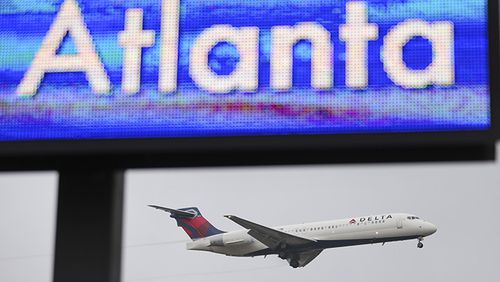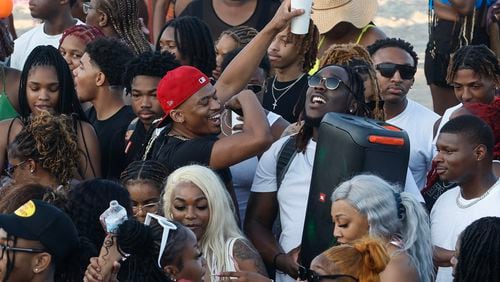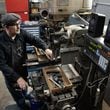Delta’s SkyMiles changes: Frequent fliers weigh in
- On earning a free flight: "Now, you don't know exactly when you're going to get there. It's a moving target," said Jeff Taylor, a frequent flier who lives in Johns Creek.
- "They're trying to remove expectations," said Brian Cohen, who has a blog called The Gate focused on frequent flier programs and travel and lives in Marietta. "This way, it's all out the window and [travelers are] going to have to research for that specific flight, that specific route, what is going to cost — just like in dollars."
- Phil Bush, a Diamond medallion member with Delta who lives in Brookhaven, said he doesn't expect Delta's latest changes to affect him much. "I think Delta has done a better job of dealing with their ultra frequent fliers."
Sample rates for award flights on Delta Air Lines in June 2016
- Atlanta to New York, coach class. 25,000 miles
- Atlanta to Los Angeles, coach class. 37,500 miles
- Atlanta to Paris, coach class. 60,000 miles
- Sydney to Atlanta, business class. 750,000 miles
How many SkyMiles does it take to get that free flight on Delta? The sky is the limit.
A business-class seat from Sydney to Atlanta, for example, has just jumped from merely astronomical to nearly unfathomable. That is, from about 350,000 miles in May 2016 to 750,000 in June 2016, for a flight that would cost nearly $6,200 in cash. How do you amass 750,000 miles? You could fly roundtrip from Atlanta to Shanghai 49 times. Or you could just repeatedly circumnavigate the globe: 30 revolutions would do it.
Starting next summer, Delta will once again fundamentally change its SkyMiles program. As with the Sydney example, some of the priciest routes will no longer have a cap. But the changes will affect even the least expensive routes, too.
Remember, back a few SkyMiles ago, how you could look up a city or resort and see how many miles you would need to fly there? Welcome to Delta’s three Ds: “destination, demand and other dymanics.” Essentially, the three Ds mean that “award” flights – that is, the flights you are awarded in exchange for miles – will be priced more like regular flights are priced in dollars.
So the SkyMiles required to get a free ticket may change, just as regular fares do, according to where you’re going, how many other people want to go there, when you reserve the ticket and other factors.
While the pitch of frequent flier programs in the past may have been a free flight at 25,000 miles, “our pitch is going to be, Delta has miles that are easy to use and never expire,” SkyMiles managing director Karen Zachary said. She said Delta “is really seeking to give our customers a lot of advance notice on changes, that we might be increasing our award pricing in the future.”
On the plus side, Delta says it is making more flights available for 25,000 miles or less, but the three Ds may complicate frequent fliers’ planning.
“With this scheme in place, Delta has the flexibility of pricing lower or higher than what might have been the norm previously,” FrequentFlier.com publisher Tim Winship, who calls Delta’s move “The Great Obfuscation.”
United and American have not followed Delta in its move to dynamic mileage rates. Southwest Airlines and JetBlue use a different form of variable prices for award flights, but frequent flier program experts say those systems are easier to understand because the number of miles required is directly tied to the fare.
Although the shift to variable prices for award flights has drawn widespread criticism among frequent fliers, Delta said most award prices will remain unchanged, and says it has already increased the number of awards available at 25,000 miles, and has offered some one-way deals at 10,000, 7,500 or even 5,000 miles.
Among frequent fliers, there are different types of members, and Delta has different ways to approach them.
A key priority for Delta and its SkyMiles program is to offer the best travel experience for elite frequent fliers. “We’re looking at opportunities to reward our best customers,” Zachary said.
At the same time, “We’re looking at ways to deliver value to the masses of our program…. We want our members to be able to use their miles,” Zachary said. She said Delta has more than doubled the number of award seats available.
The dual strategy is part of Delta’s attempt to quell complaints that its frequent flier miles are impossible to use, while also catering to high-spending travelers with luxury amenities.
At the root of the matter is the fact that one of Delta’s aims is to keep seats available for customers willing to pay — especially for those willing to pay a lot.
The way frequent flier Phil Bush sees it, airlines like Delta are increasingly using analytics “to be able to charge more when they know the market will bear.”
Case in point: International travelers are a key market, and well-heeled customers are paying top dollar for luxurious suites and seat pods on foreign carriers, driving Delta and its U.S. competitors to invest more in their international business class offerings. That’s expensive, and Delta is eager to reap the returns from that investment through higher fares.
With Delta’s switch this year to earning points based on dollars spent rather than miles flown, travel blogger Brian Cohen points out that “it’s that much more difficult to earn” miles, making it even more important to be careful about spending those miles.
Yet to be seen is whether any customers defect from Delta to Southwest or other competitors.
“If you’re a frequent business traveler, especially somebody traveling on walk-up fares… you’re going to be fine,” Winship said. “If you’re an infrequent leisure traveler, your expectations have to have been significantly diminished with the new program.”
About the Author







